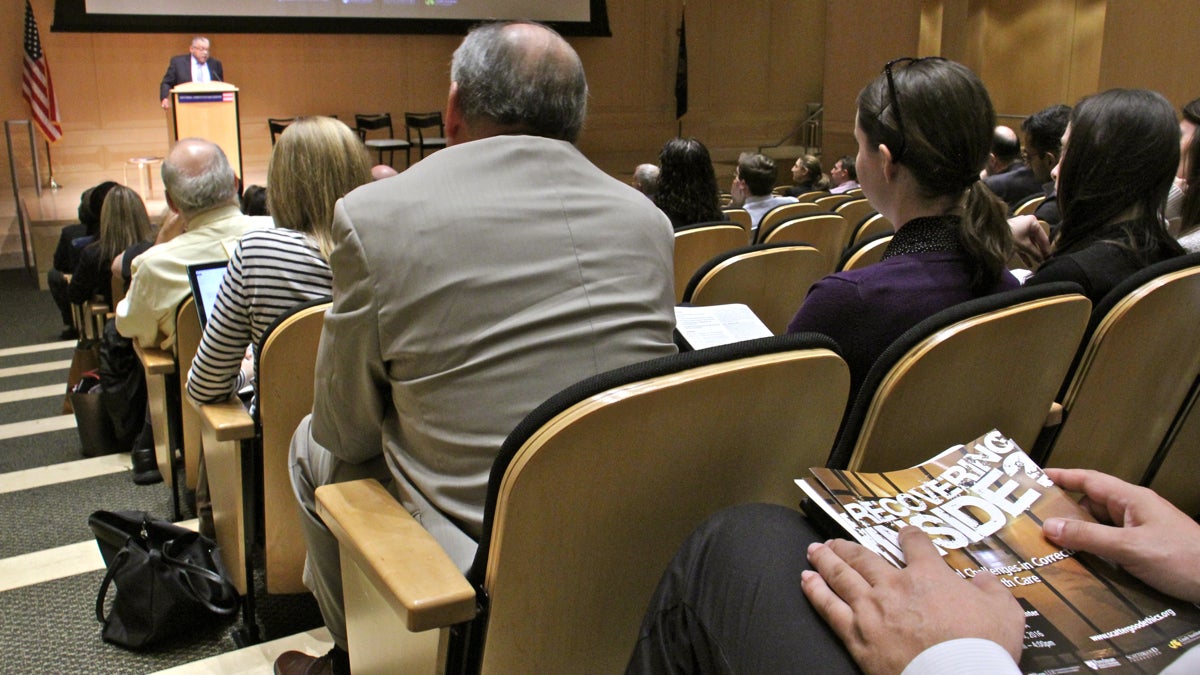Conference focuses on easing difficulty in providing mental health behind bars

Former Philadelphia Police Commissioner Charles Ramsey addresses a conference at the Constitution Center looking at the treatment of mentally ill prisoners. (Emma Lee/WHYY)
Philadelphia has the highest per capita incarceration rate of the country’s 10 largest cities.
Given that so many people in prison have mental health issues, that creates a wealth of ethical concerns. A conference, sponsored by the University of Pennsylvania and The Scattergood Foundation, among others, recently looked at those concerns in depth.
Dominic Sisti, who teaches medical ethics and health policy at Penn, organized the event to spur more thought about the ethics of mental health care delivery in prisons.
Many prisoners with serious mental illness have committed only minor crimes, he said. “And this is, to me, a huge ethics and social justice transgression.”
He’s also concerned about the use of solitary confinement, a practice he finds “ethically abhorrent.”
“There needs to be some thought given to transitional spaces, protective spaces. And this really gets back to the original problem, which is that these are individuals who probably ought not be in a jail in the first place,” he said. “They probably ought to be in a psychiatric hospital, or a forensic institution.”
Health care providers face myriad ethical quagmires — how do you make sure a mentally ill prisoner gets the kind of care he or she might get in the community? How do you protect that patient’s confidentiality?
Dr. Annette Hanson, who directs the University of Maryland’s forensic psychiatry fellowship, said there’s an even more basic barrier.
“I’ve done a clinic in a bare cell, with no ventilation, no air conditioning, in August, where the external temperature was 90 degrees,” she said.
If you’re going to fix anything, she said, “fix the physical environment.”
Sisti said the situation may be improving.
“I think we’ve begun to see a change in the way policy makers are viewing and understanding mass incarceration, finally there has been some movement in terms of sentencing reform, in terms of minor crimes like drug offenses,” he said. “And we’re learning more and more about the relationship between these minor offenses and mental illness.”
That’s becoming more necessary, Sisti said, because jailing the mentally ill for nuisance crimes isn’t just unethical. From a practical perspective, he said, it can also be quite costly.
The conference also explored how to appropriately train police to effectively work with someone in crisis.
This disclosure: The Scattergood Foundation supports WHYY.
Philadelphia has the highest per capita incarceration rate of the US’s ten largest cities. Given that so many people in prison have mental health issues, that creates a wealth of ethical concerns. A conference, sponsored by UPenn and The Scattergood Foundation, among others, recently looked at those concerns in depth.
Dominic Sisti, who teaches Behavioral Healthcare at Penn, organized the event to spur more thought about the ethics of mental health care delivery in prisons.
He says many prisoners with serious mental illness have committed only minor crimes.
“And this is to me a huge ethics and social justice transgression.”
He’s also concerned about the use of solitary confinement, a practice he finds “ethically abhorrent.”
“To me there needs to be some thought given to transitional spaces, protective spaces. And this really gets back to the original problem, which is that these are individuals who probably ought not be in a jail in the first place. They probably ought to be in a psychiatric hospital, or a forensic institution.”
Healthcare providers face myriad ethical quagmires — how do you make sure a mentally ill prisoner gets the kind of care they might get in the community? How do you protect that patient’s confidentiality?
Dr. Annette Hanson directs the University of Maryland’s forensic psychiatry fellowship. She says there’s an even more basic barrier.
“I’ve done a clinic in a bare cell, with no ventilation, no air conditioning, in August, where the external temperature was 90 degrees,” she says. If you’re going to fix anything, she says, “fix the physical environment.”
Sisti says the situation may be improving.
“I think we’ve begun to see a change in the way policy makers are viewing and understanding mass incarceration, finally there has been some movement in terms of sentencing reform, in terms of minor crimes like drug offenses. And we’re learning more and more about the relationship between these minor offenses and mental illness.”
That’s becoming more necessary, he says, because jailing the mentally ill for nuisance crimes isn’t just unethical — from a practical perspective, it can also be quite costly.
The conference also explored how to appropriately train police to effectively work with someone in crisis.
WHYY is your source for fact-based, in-depth journalism and information. As a nonprofit organization, we rely on financial support from readers like you. Please give today.

